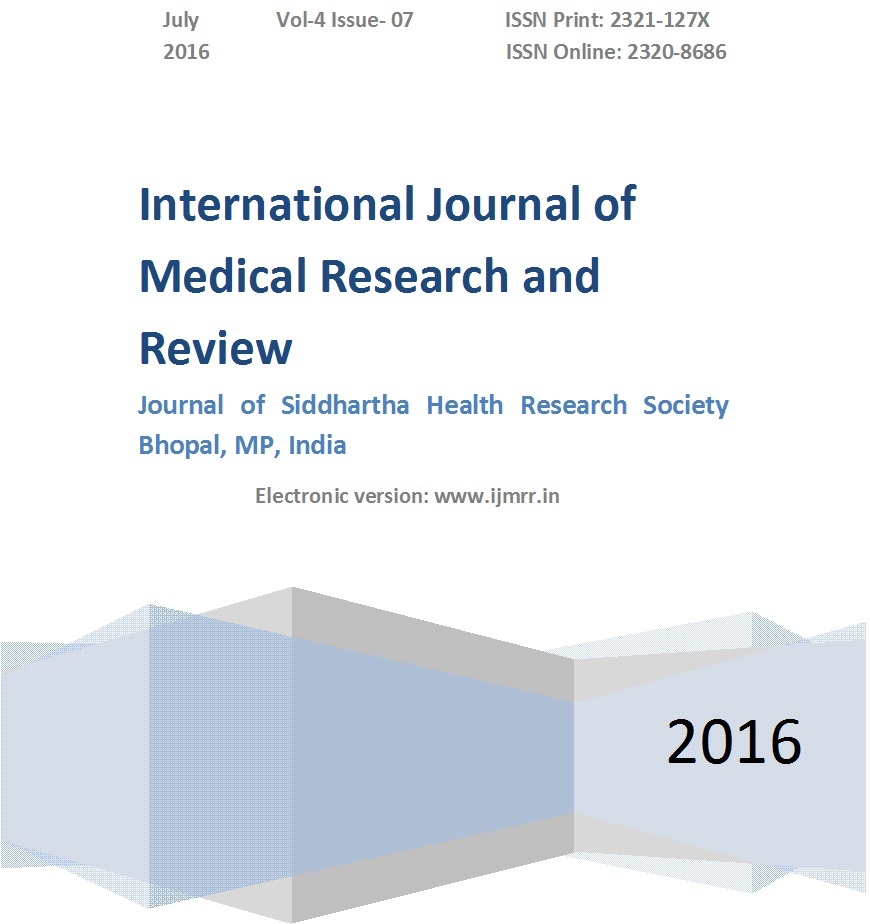Analysis of factors affecting mortality outcome in ischemic bowel disease- a study of 50 cases
Abstract
Introduction: Ischemic bowel disease is the outcome of inadequate supply of oxygen to the intestine leading to ischemia having a plethora of symptoms and signs which are often inconspicuous leading to delayed diagnosis exacerbating already poor patient outcomes. There is a definite need to classify patients into high and low risk categories, so that intensive monitoring and care can be delivered to improve mortality outcome.
Methods: We have done a prospective study of 50 adult cases of ischemic bowel disease confirmed on radiology, intra-operative findings and histopathology and compared the mortality and severity of disease with various patient parameters and analyzed significant correlations if any.
Results: Majority of patients were adult males above age of 50 years with acute presentation. Hypertension and diabetes were commonly seen. Clinically, tenderness and tachycardia were common. ECG was abnormal in 72% patients. On imaging, thrombotic SMA involvement was present in majority of patients. Therapeutically, 90% patients were explored with a high mortality rate (71%) commonly the cause being sepsis (47%). Overall mortality was 64%. Small bowel was commonly affected. Majority of patients suffered from sepsis requiring ionotropic and ventilatory support. All patients with SMV thrombosis survived. Raised serum creatinine and altered pH were strongly associated with mortality. Also patients with ischemic bowel segment more than 80cm were at a high risk of death.
Conclusion: The need for a scoring system based on parameters discussed has to be addressed, to stratify patients who will require critical and specialized intensive care and improve mortality outcomes.
Downloads
References
Ricotta J, Akbari C. Abdominal vascular emergencies (in) Zinner M, Ashley S (eds) Maingot’s Abdominal Operations. 12th ed McGraw-Hill Publishers. 2013; 13: 261-288.
Schoots IG, Koffeman GI, Legemate DA, Levi M, Van Gulik TM. Systematic review of survival after acute mesenteric ischaemia according to disease aetiology. Br Jour Surg 2004; 91(1):17-27.doi: https://doi.org/10.1002/bjs.4459.
Cudnik MT, Darbha S, Jones J, Macedo J, Stockton SW, Hiestand BC. The diagnosis of acute mesenteric ischemia: A systematic review and meta-analysis. Acad Emerg Med. 2013 Nov; 20(11):1087–100.doi: https://doi.org/10.1111/acem.12254.
Akyıldız HY, Sözüer E, Uzer H, Baykan M, Oz B. The length of necrosis and renal insufficiency predict the outcome of acute mesenteric ischemia. Asian J Surg. 2015 Jan;38(1):28-32.doi: https://doi.org/10.1016/j.asjsur.2014.06.001.
Bilgiç IC, Gelecek S, Mahir Ozmen M, Kasapoglu B. The association of elevated mean platelet volume with the outcome of acute mesenteric ischemia. Blood Coagul Fibrinolysis. 2015 Oct; 26(7):727-30.doi: https://doi.org/10.1097/mbc.0000000000000208.
Wilson C, Gupta R, Gilmour DG, Imrie CW. Acute superior mesenteric ischaemia. Br J Surg. 1987 Apr;74(4):279-81.doi: https://doi.org/10.1002/bjs.1800740417.
Reginelli A, Iacobellis F, Berritto D, Gagliardi G, Di Grezia G, Rossi M, Fonio P, Grassi R. Mesenteric ischemia: the importance of differential diagnosis for the surgeon. BMC Surg. 2013;13 Suppl 2:S51. doi: https://doi.org/10.1186/1471-2482-13-s2-s51. Epub 2013 Oct 8.
Wadman M, Syk I, Elmståhl S. Survival after operations for ischaemic bowel disease. Eur J Surg. 2000 Nov;166(11):872-7.doi: https://doi.org/10.1080/110241500447263.
Kougias P, Lau D, El Sayed HF, Zhou W, Huynh TT, Lin PH. Determinants of mortality and treatment outcome following surgical interventions for acute mesenteric ischemia. J Vasc Surg. 2007 Sep;46(3):467-74.doi: https://doi.org/10.1016/j.jvs.2007.04.045.
Paladino NC, Inviati A, Di Paola V, Busuito G, Amodio E, Bonventre S, et al. Predictive factors of mortality in patients with acute mesenteric ischemia. A retrospective study. Ann Ital Chir. 2014 May-Jun;85(3):265-70.
Pecoraro F, Rancic Z, Lachat M, Mayer D, Amann-Vesti B, Pfammatter T, et al. Chronic mesenteric ischemia: critical review and guidelines for management. Ann Vasc Surg. 2013 Jan;27(1):113-22.doi: https://doi.org/10.1016/j.avsg.2012.05.012.
Park WM, Gloviczki P, Cherry KJ, Hallett JW, Bower TC, Panneton JM, et al. Contemporary management of acute mesenteric ischemia: Factors associated with survival. J Vasc Surg. 2002 May;35(5):853-9.doi: https://doi.org/10.1067/mva.2002.120373.
Rhee RY, Gloviczki P, Mendonca CT, Petterson TM, Serry RD, Sarr MG, et al. Mesenteric venous thrombosis: still a lethal disease in the 1990s. J Vasc Surg. 1994 Nov;20(5):688-97.doi: https://doi.org/10.1016/s0741-5214(94)70155-5.
Acosta-Merida MA, Marchena-Gomez J, Hemmersbach-Miller M, Roque-Castellano C, Hernandez-Romero JM. Identification of risk factors for perioperative mortality in acute mesenteric ischemia. World J Surg. 2006 Aug; 30(8):1579–85.doi: https://doi.org/10.1007/s00268-005-0560-5.
Alhan E, Usta A, Çekiç A, Saglam K, Türkyılmaz S, Cinel A. A study on 107 patients with acute mesenteric ischemia over 30 years. Int J Surg. 2012 Jan;10(9):510–13.doi: https://doi.org/10.1016/j.ijsu.2012.07.011.
Dahlke MH, Asshoff L, Popp FC, Feuerbach S, Lang SA, Renner P, et al. Mesenteric ischemia--outcome after surgical therapy in 83 patients. Dig Surg. 2008 Jan; 25(3):213–9.doi: https://doi.org/10.1159/000140692.
Sitges-Serra A, Mas X, Roqueta F, Figueras J, Sanz F. Mesenteric infarction: an analysis of 83 patients with prognostic studies in 44 cases undergoing a massive small-bowel resection. Br J Surg. 1988 Jun;75(6):544–8.doi: https://doi.org/10.1002/bjs.1800750614.
Park KS, Lim JW, Kim H. Inhibitory mechanism of omega-3 fatty acids in pancreatic inflammation and apoptosis. Ann N Y Acad Sci. 2009 Aug; 1171:421–7.doi: https://doi.org/10.1111/j.1749-6632.2009.04887.x.
Radonak J, Lakyová L, Toporcer T, Bober J. Mesenteric ischemia--late diagnosis or managed disease? Rozhl Chir. 2010 Apr; 89(4):242–6.
Böttger T, Jonas J, Weber W, Junginger T. Sensitivity of preoperative diagnosis in mesenteric vascular occlusion. Bildgebung. 1991 Jan; 58(4):192–8.
Oldenburg WA, Lau LL, Rodenberg TJ, Edmonds HJ, Burger CD. Acute mesenteric ischemia: a clinical review. Arch Intern Med. 2004 May; 164(10):1054–62.doi: https://doi.org/10.1001/archinte.164.10.1054.
Menke J. Diagnostic accuracy of multidetector CT in acute mesenteric ischemia: systematic review and meta-analysis. Radiology. 2010 Jul; 256(1):93–101.doi: https://doi.org/10.1148/radiol.10091938.
Huang H-H, Chang Y-C, Yen DH-T, Kao W-F, Chen J-D, Wang L-M, et al. Clinical factors and outcomes in patients with acute mesenteric ischemia in the emergency department. J Chin Med Assoc. 2005 Jul; 68(7):299–306.doi: https://doi.org/10.1016/s1726-4901(09)70165-0.
Cunningham CG, Reilly LM, Rapp JH, Schneider PA, Stoney RJ. Chronic visceral ischemia.Three decades of progress. Ann Surg. 1991 Sep; 214(3):276–87.doi: https://doi.org/10.1097/00000658-199109000-00010.
Ozturk G, Aydinli B, Atamanalp SS, Yildirgan MI, Ozoğul B, Kısaoğlu A. Acute mesenteric ischemia in young adults. Wien Med Wochenschr. 2012 Aug; 162(15-16):349–53.doi: https://doi.org/10.1007/s10354-012-0120-1.



 OAI - Open Archives Initiative
OAI - Open Archives Initiative


